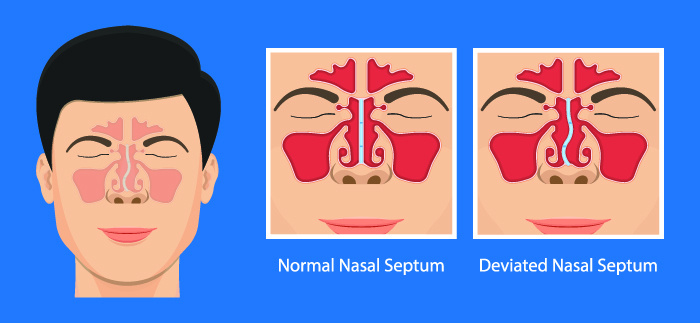Deviated Septum Surgery in Kondapur, Hyderabad
A condition where the nasal septum is off-centre is referred to as Deviated Septum.
The most common symptom of a Deviated Septum includes the congested nose, difficulty in breathing, etc. It can be treated with certain medications or surgery.
What Is Deviated Septum?
Sometimes, in some people, the nasal septum, i.e. the bone and cartilage that separates the nostrils and divides the nasal cavity of the nose in half, is off-centred or crooked, the severe unevenness is referred to as Deviated Septum.
The causes behind a Deviated Septum is usually hereditary or genetic and sometimes due to injuries that may be caused by contact sports like fighting etc. It is generally curable with the help of certain devices, medications or surgery.

Deviated Septum can cause a nosebleed, snoring, difficulty in breathing, congestion etc.
What Are The Symptoms Of a Deviated Septum?
Some of the common symptoms of Deviated Septum may include:
- Difficulty in breathing
- Nosebleed
- Facial pain
- Snoring (noise while sleeping)
- Blockage in one or both the nostril
Other symptoms may include:
- Shortness of breath
- Sinus infection
- Dryness in one nostril
- Having one side of the nostril through which breathing is easier
- Headache
- Mouth breathing
- Physical deformity
When to See a Doctor?
If you experience any of the following symptoms:
- Snoring
- Nosebleed
- Congested nose
- Improper breathing
or any of the symptoms mentioned before, you should seek immediate medical attention and schedule your appointment with healthcare professionals at the earliest.
Request an appointment at Apollo Spectra Hospitals, Kondapur
Call 1860-500-2244 to book an appointment
How Can We Prevent Deviated Septum?
There aren’t many measures on how to prevent a Deviated Septum because it can be genetic or inherited. However, you may be able to prevent injuries caused by certain activities on your nose, which can cause Deviated Septum, few of those measures include:
- Wearing a helmet
- Wearing a midface mask when playing sports such as football or volleyball
- Wearing a seat belt when riding in a motorized vehicle
How Is Deviated Septum Diagnosed?
When you experience signs and symptoms like facial pain, congested nose, nose bleeding or snoring etc. then, you must consult a healthcare professional.
To make a further diagnosis, your doctor at Apollo Kondapur may examine your nostrils with a nasal speculum and may check the septum's placement. The doctor may further ask you questions related to sleep, snoring, sinus problems or difficulty breathing.
How Can We Treat Deviated Septum?
Your doctor may prescribe you certain medications first to help you with the Deviated Septum, however, if you still experience symptoms like congested nose etc. then you might be recommended to go through surgeries that help correct the Deviated Septum, for instance, Septoplasty, which is a corrective surgical procedure that is conducted inside the nose in order to straighten or reposition the deviated nasal septum in the centre of your nose.
Some of the other common treatments for the symptoms may include:
- Nasal strips
- Decongestants
- Nasal steroid spray
- Antihistamines
Deviated Septum is common and about 70 to 80 per cent of the people have a Deviated Septum that is noticeable. For most people, the condition doesn't cause symptoms, or symptoms are minor and no treatment is required, however, a Deviated Septum that is moderate to severe can result in nasal obstruction.
It is mostly curable through treatments that include certain devices, medications or a corrective surgical procedure, like Septoplasty, etc.
Its main cause may commonly be genetic or inheritance, or injuries which may be caused due to certain activities like contact sports like, fighting, football, martial arts etc., or if the nose experiences some kind of trauma.
Sometimes, a Deviated Septum can lead to complications, which may include sleep apnea, facial pain, nose congestion, snoring, difficulty or improper breathing, nosebleeds or infections. For some cases, Deviated Septum may not cause any issues and may not require treatment, however, severe cases may call for surgery.
Deviated Septum may change with time and natural ageing that happens in our faces and noses may have the potential to make a deviated septum worse, however, even if someone may not experience worse symptoms related to the Deviated Septum, they may probably experience changing or escalating symptoms.
Up to 25% of the patients report nasal congestion or obstruction redeveloping after a Deviated Septum surgery, this may be because the congestion may often be due to other causes besides the structural issues that are associated with the nose. These causes may include severe allergies, severe inflammation due to irritants or chronic sinusitis. So it might be that the symptoms may persist (or return) after the surgery.
Symptoms
Our Doctors
DR. DASARI PRASADA RAO
MBBS,MS,M.Ch...
| Experience | : | 49 Yeras Experience |
|---|---|---|
| Speciality | : | Interventional and C... | Location | : | Ameerpet |
| Timings | : | Mon - Sat : 9:00 AM ... |
DR. MOHAMMED NASEERUDDIN
MBBS, MS (ENT)...
| Experience | : | 8 Yeras Experience |
|---|---|---|
| Speciality | : | ENT, Head and Neck S... | Location | : | Kondapur |
| Timings | : | Mon - Sat : 11:00AM... |
DR. PUROHITHI P
MBBS, MD, IDRA, FIPM...
| Experience | : | 4 Yeras Experience |
|---|---|---|
| Speciality | : | Sr. Interventional P... | Location | : | Kondapur |
| Timings | : | Mon - Sat : 5:00 PM ... |
DR. CHINNAYA PARIMI
MBBS, FACS (Fellow, ...
| Experience | : | 19 Yeras Experience |
|---|---|---|
| Speciality | : | General Surgery & Ga... | Location | : | Kondapur |
| Timings | : | Mon - Sat: 9:30 AM t... |
Our Top Specialities
NOTICE BOARD
CONTACT US
CONTACT US
 Book Appointment
Book Appointment






.svg)
.svg)
.svg)
.svg)








